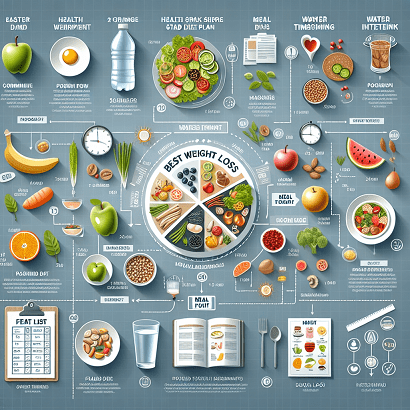Table of Contents
Embarking on the best weight loss diet plan journey to shed unwanted pounds can feel like navigating through a labyrinth of conflicting advice and countless diet plans. Given the abundance of information available, discerning the path that aligns with one’s personal health goals and lifestyle preferences can be challenging. However, the endeavor to pinpoint the best weight loss diet plan that resonates with individual needs is a crucial step towards achieving sustainable results. This comprehensive guide aims to illuminate the various facets of popular diet plans, thereby empowering readers to make informed decisions in selecting the diet program that best suits them.
Understanding the Importance of Finding the Best Weight Loss Diet Plan
Embarking on the best weight loss diet plan journey without a clear strategy is akin to setting sail without a compass. The myriad of diet programs available today boast their unique methods and benefits, yet what works for one individual may not necessarily yield the same results for another. Recognizing this individual variability is the cornerstone of a successful weight loss journey. The significance of this understanding lies in its ability to foster a sense of empowerment and motivation, as one navigates through the options to find a diet plan that not only accommodates personal preferences and lifestyle but also addresses specific health considerations.
At the heart of this exploration is the acknowledgment of the multifaceted nature of weight loss. It is a process that extends beyond mere calorie counting, encompassing factors such as nutritional balance, physical activity, mental well-being, and sustainable habit formation. Hence, the quest for the best weight loss diet plan is not merely about short-term weight loss but rather about embarking on a transformative journey towards a healthier, more vibrant self.
Moreover, the best weight loss diet plan serves as a blueprint for long-term health and wellness. It transcends the simplistic goal of weight reduction, aiming instead to instill lifelong habits that promote overall well-being. Thus, the importance of finding a diet plan that resonates with one’s personal needs and goals cannot be overstated, as it lays the foundation for a journey filled with self-discovery, empowerment, and lasting change.
Different Types of Weight Loss Diet Programs
In the realm of weight loss, diversity reigns supreme. From low-carbohydrate regimens to plant-based approaches, the spectrum of the best weight loss diet plan available today caters to a wide array of dietary preferences and health objectives. Understanding the fundamental principles and philosophies behind these various diet plans is the first step in determining which program might align with one’s personal health journey.
One prevalent category encompasses diets that focus on macronutrient manipulation, such as the Atkins, Keto, and Paleo diets. These programs advocate for adjustments in the consumption of carbohydrates, fats, and proteins, positing that such changes can lead to significant weight loss and improvements in overall health. The Mediterranean diet, which emphasizes whole foods, healthy fats, and a moderate intake of carbohydrates, is an example of another approach that has its roots in cultural and regional dietary patterns.
Additionally, there are diets that center around ethical and environmental considerations, such as the Vegan diet. This plant-based approach eschews all animal products, advocating for a diet rich in fruits, vegetables, legumes, and grains. Beyond these categories, there are myriad other diet plans, each with its own unique focus and methodology, from intermittent fasting regimes to diets that eliminate specific food groups or allergens.
Navigating through these options requires a thoughtful assessment of one’s personal health goals, dietary preferences, lifestyle, and any underlying medical conditions. It involves a careful consideration of not only the potential benefits but also the challenges and limitations of each diet plan. Armed with this knowledge, individuals can embark on a journey toward selecting the best weight loss diet plan that promises not just short-term results but also aligns with their long-term health and wellness goals.
Assessing Your Personal Needs and Goals
The journey toward selecting the best weight loss diet plan begins with profound self-reflection. It necessitates an honest assessment of one’s health objectives, lifestyle considerations, dietary preferences, and any medical conditions that might influence dietary choices. This introspective process is instrumental in laying the groundwork for a diet plan that is not only effective but also sustainable and enjoyable.
Central to this assessment is the establishment of clear, realistic health goals. Whether the aim is to shed a specific number of pounds, improve overall physical health, or address particular medical issues, having well-defined objectives serves as a guiding light in the selection process. It is also essential to consider one’s lifestyle, including work schedules, family commitments, and social activities, as these factors play a pivotal role in determining the feasibility and sustainability of the best weight loss diet plan.
Moreover, dietary preferences and restrictions are critical components of this evaluation. Acknowledging one’s inclinations towards certain foods, as well as any allergies or intolerances, ensures that the chosen best weight loss diet plan is not only effective but also enjoyable and devoid of potential health risks. Additionally, considering one’s willingness and ability to prepare meals and adhere to dietary guidelines is crucial in selecting a program that aligns with one’s daily routine and capabilities.
This comprehensive assessment paves the way for a personalized approach to weight loss, one that acknowledges the uniqueness of each individual’s journey. It empowers individuals to make informed decisions, selecting a diet program that resonates with their specific needs and goals, thereby enhancing the likelihood of long-term success and satisfaction.
The Atkins Diet: Pros and Cons
The Atkins diet, pioneered by Dr. Robert Atkins in the 1970s, stands as a testament to the enduring appeal of low-carbohydrate eating plans. Central to the Atkins philosophy is the assertion that reducing carbohydrate intake forces the body to burn stored fat for energy, thereby facilitating weight loss. This diet plan is structured in phases, beginning with a strict reduction in carbohydrate intake and gradually reintroducing carbs as one approaches their target weight.
One of the primary advantages of the Atkins diet is its potential for rapid weight loss, particularly in the initial stages. This can serve as a significant motivator for individuals embarking on their weight loss journey. Additionally, the diet’s emphasis on protein and fat consumption can lead to increased satiety, reducing the likelihood of hunger and cravings. The Atkins diet also allows for a degree of flexibility in food choices within the confines of low-carbohydrate eating, making it adaptable to different tastes and preferences.
However, the Atkins diet is not without its drawbacks. The severe restriction of carbohydrates, especially in the early phases, can lead to nutritional deficiencies and side effects such as headaches, dizziness, and constipation. There is also the risk of high saturated fat intake, which may have adverse effects on heart health over time. Furthermore, the diet’s initial rapid weight loss is often attributable to water loss rather than fat loss, and there is the potential for weight regain if one reverts to their previous eating habits.
Ultimately, the Atkins diet may be a suitable option for individuals seeking a structured, low-carbohydrate approach to weight loss. Yet, it is imperative for prospective adherents to consider their ability to adhere to the dietary restrictions as well as the potential long-term implications for their health and well-being.
The Mediterranean Diet: Pros and Cons
The Mediterranean diet, inspired by the dietary patterns of the countries bordering the Mediterranean Sea, is lauded for its emphasis on whole foods, heart-healthy fats, and a balanced intake of macronutrients. This diet encourages the consumption of fruits, vegetables, whole grains, legumes, nuts, and olive oil, along with moderate amounts of fish, poultry, and dairy. Red meat and processed foods are to be consumed sparingly. The Mediterranean diet is not only a weight loss strategy but also a lifestyle approach aimed at improving overall health and longevity.
One of the most significant benefits of the Mediterranean diet is its association with reduced risks of cardiovascular diseases, diabetes, and certain types of cancer. The diet’s focus on nutrient-dense, antioxidant-rich foods supports weight management and promotes overall health. Additionally, the diversity of foods allowed makes this diet highly palatable and adaptable to various culinary traditions, enhancing its sustainability over the long term.
However, the Mediterranean diet may present challenges for individuals who are accustomed to a diet high in processed foods or those who have specific dietary restrictions that limit the consumption of grains or legumes. Additionally, due to its emphasis on high-quality, fresh foods, some may find this diet to be more expensive or time-consuming compared to other eating plans.
Despite these potential limitations, the Mediterranean diet stands as a testament to the benefits of a balanced, whole-food-based approach to eating. Its emphasis on variety, flavor, and nutritional quality makes it an appealing and effective option for those seeking not only to lose weight but also to enhance their overall health and well-being.
The Keto Diet: Pros and Cons
The Ketogenic, or Keto, diet, has surged in popularity as a weight loss strategy that emphasizes a high-fat, moderate-protein, and low-carbohydrate intake. This diet aims to induce a state of ketosis, where the body burns fat for fuel instead of carbohydrates. By drastically reducing carbohydrate intake, the Keto diet seeks to alter the body’s metabolic state, resulting in significant weight loss and potential health benefits.
One of the primary advantages of the Keto diet is its effectiveness in promoting rapid weight loss, making it an attractive option for those seeking quick results. The diet’s high-fat content can also increase satiety, reducing hunger and overall calorie intake. Additionally, some adherents report improvements in blood sugar control and a decrease in triglyceride levels, contributing to better overall health.
However, the Keto diet is not devoid of challenges and potential drawbacks. The strict limitation on carbohydrates can make it difficult to maintain, especially over the long term, and may lead to feelings of deprivation or boredom with food choices. There is also the risk of nutrient deficiencies due to the exclusion of certain food groups, such as fruits and whole grains. Moreover, the diet’s high saturated fat content may raise concerns regarding its long-term impact on heart health.
In conclusion, while the Keto diet offers a promising approach to weight loss and metabolic health for some individuals, it is crucial to weigh its potential benefits against the challenges and health risks it may pose. Prospective adherents should consider their ability to adhere to the diet’s restrictions and the potential impact on their overall health and well-being.
The Paleo Diet: Pros and Cons
The Paleo diet, also known as the Caveman diet, seeks to emulate the dietary patterns of our Paleolithic ancestors. It focuses on the consumption of whole foods such as meats, fish, fruits, vegetables, nuts, and seeds, while excluding processed foods, grains, legumes, and dairy. The premise behind the Paleo diet is that modern eating habits are misaligned with our genetic makeup, contributing to the prevalence of obesity, diabetes, and other health issues. By reverting to the dietary practices of the Paleolithic era, proponents believe it is possible to improve health and achieve weight loss.
One of the key advantages of the Paleo diet is its emphasis on whole, nutrient-dense foods, which can lead to improved satiety and reduced calorie intake. The diet’s focus on protein and healthy fats also supports muscle maintenance and energy levels. Furthermore, by eliminating processed foods and sugars, the Paleo diet can contribute to better blood sugar control and a reduction in the risk of chronic diseases.
However, the Paleo diet also presents certain challenges. The exclusion of whole grains, legumes, and dairy can result in nutritional deficiencies, particularly in calcium and vitamin D. The diet’s restrictive nature may also make it difficult to sustain in the long term, potentially leading to boredom or a sense of deprivation. Additionally, the emphasis on high-quality, organic foods can make the Paleo diet more expensive than other eating plans.
In essence, while the Paleo diet offers a straightforward approach to eating that may benefit weight loss and health, it is important for individuals to consider its nutritional completeness and practicality. Adapting the diet to meet personal health needs and lifestyle considerations is crucial to ensuring its effectiveness and sustainability.
The Vegan Diet: Pros and Cons
The Vegan diet, characterized by the exclusion of all animal products, has gained popularity not only for its ethical and environmental implications but also for its potential health benefits. This plant-based diet emphasizes fruits, vegetables, legumes, grains, nuts, and seeds, providing a rich array of nutrients. The Vegan diet is associated with a lower risk of heart disease, hypertension, type 2 diabetes, and certain cancers, attributed to its high content of dietary fiber, vitamins, and phytonutrients.
One of the primary benefits of the Vegan diet is its impact on weight management and health. The high fiber content of plant-based foods can enhance satiety and reduce overall calorie intake, facilitating weight loss. Additionally, the diet’s emphasis on whole, unprocessed foods contributes to improved metabolic health and well-being.
However, adopting a Vegan diet also presents certain challenges. Ensuring adequate intake of certain nutrients, such as vitamin B12, iron, calcium, and omega-3 fatty acids, which are predominantly found in animal products, requires careful planning and, sometimes, supplementation. The diet’s restrictive nature can also pose social and practical challenges, particularly when dining out or attending social gatherings.
Despite these potential hurdles, the Vegan diet offers a viable path to weight loss and improved health for those committed to navigating its complexities. With careful planning and consideration of nutritional needs, the Vegan diet can be both nourishing and satisfying, aligning with personal health goals and ethical values.
Customizing a Weight Loss Diet Program for Your Needs
The journey of finding the best weight loss diet plan for improved health is a highly personal endeavor. Recognizing that there is no one-size-fits-all solution is key to finding a diet program that aligns with individual needs, preferences, and lifestyles. Customizing a weight-loss diet involves integrating elements from various diet plans, adapting dietary guidelines to meet personal health goals, and addressing any specific nutritional requirements or medical conditions.
The initial step in customizing a diet plan is to reflect on personal preferences and lifestyle factors. Consideration should be given to food preferences, cooking skills, budget constraints, and daily routines. This ensures that the chosen diet is not only effective in achieving weight loss goals but also sustainable and enjoyable in the long term.
Additionally, identifying any specific health considerations or nutritional needs is crucial. For individuals with medical conditions such as diabetes, heart disease, or food allergies, dietary adjustments may be necessary to accommodate these issues. Consulting with a healthcare provider or a registered dietitian can provide valuable insights and guidance in customizing a diet plan that supports overall health and well-being.
Ultimately, customizing a weight loss diet program requires a balance between following general dietary principles and tailoring these guidelines to fit one’s unique circumstances. By adopting a flexible, personalized approach to dieting, individuals can create a plan that not only promotes weight loss but also enhances their quality of life and long-term health.
Tips for Successful Weight Loss with Your Best Weight Loss Diet Plan
Embarking on a weight loss journey requires more than selecting the right diet program; it demands commitment, adaptability, and a positive mindset. Here are some tips to enhance the likelihood of success with your chosen diet plan:
1. Set Realistic Goals: Establishing achievable, measurable goals provides direction and motivation. Celebrate small milestones to maintain momentum.
2. Prepare for Challenges: Anticipate obstacles and devise strategies to overcome them. Whether it’s managing cravings or finding time for meal prep, having a plan in place can make all the difference.
3. Seek Social Support: Share your goals with friends and family. Joining a support group or finding a diet buddy can also provide encouragement and accountability.
4. Listen to Your Body: Pay attention to hunger and fullness cues. Eating mindfully ensures that you are nourishing your body appropriately, enhancing your relationship with food.
5. Incorporate Physical Activity: While diet is crucial for weight loss, combining it with regular exercise can boost results and improve overall health.
6. Be Flexible: Rigidity can lead to frustration. If a certain aspect of your diet isn’t working, be willing to adjust your approach.
7. Focus on Overall Health: Weight loss is not just about numbers on a scale. Recognize other health improvements, such as increased energy, better sleep, or improved lab results.
By adopting these strategies, you can navigate your weight loss journey with confidence, making adjustments as needed to align with your evolving needs and goals.
Seeking Professional Guidance and Support
While the journey to finding the best weight loss diet plan can be embarked upon independently, seeking the expertise of professionals can offer invaluable support and guidance. Registered dietitians, nutritionists, and healthcare providers possess the knowledge and experience to help tailor the best weight loss diet plan to your specific needs, taking into account your health history, dietary preferences, and lifestyle.
Professional guidance can be particularly beneficial in navigating the complexities of diet planning, ensuring that your chosen program provides adequate nutrition while promoting weight loss. Experts can also offer strategies for overcoming obstacles, managing cravings, and making sustainable lifestyle changes. Furthermore, for individuals with chronic health conditions, professional support is crucial in customizing the best weight loss diet plan that safely and effectively addresses these issues.
Incorporating professional guidance into your best weight loss diet plan journey not only enhances the likelihood of success but also supports long-term health and well-being. Whether through one-on-one consultations, group programs, or online resources, leveraging the expertise of diet and health professionals can provide a solid foundation for achieving your weight loss goals.
Conclusion
Discovering your best weight loss diet plan is a journey that extends beyond mere calorie counting. It involves a holistic approach that considers your personal needs, goals, and lifestyle. Whether you gravitate towards the structured approach of the Atkins diet, the balanced and heart-healthy Mediterranean diet, the high-fat Keto diet, the natural Paleo diet, or the plant-based Vegan diet, understanding the pros and cons of each can help you make an informed decision.
Remember, the key to successful weight loss is not just in selecting the right diet but also customizing it to fit your unique needs and in approaching your journey with flexibility, patience, and support. By setting realistic goals, preparing for challenges, seeking social support, and possibly enlisting professional guidance, you can embark on a path that not only leads to effective weight loss but also to improved health and a higher quality of life.
Finding the best weight loss diet plan is a deeply personal process, one that reflects your individuality and respects your body’s needs. Embrace the journey with an open mind and a committed heart, and discover the power of the best weight loss diet plan that truly fits you.






